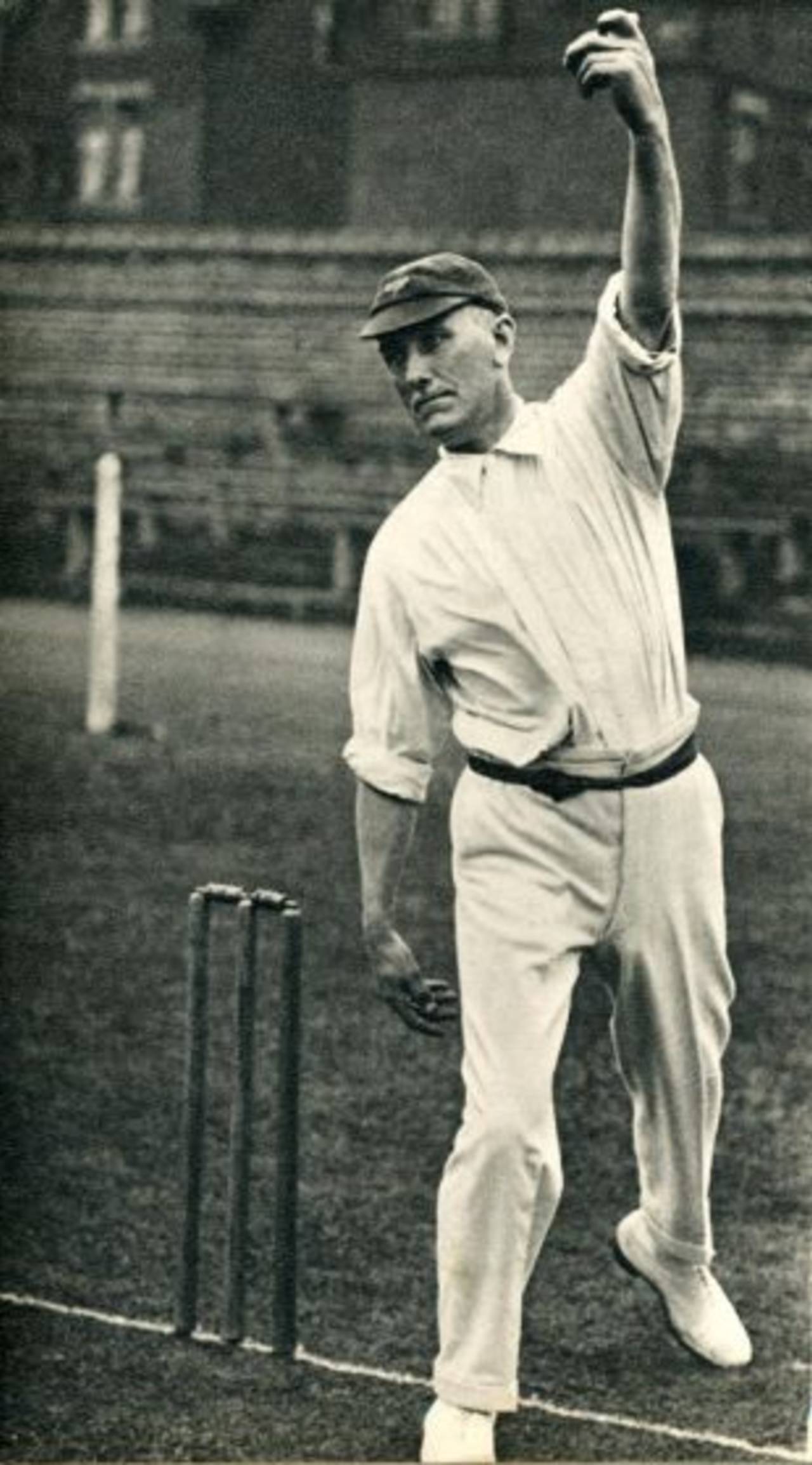Double top-scorers, and a question of ratios
Rhodes' young team-mates, playing internationals before first-class, most wickets against a side, five-fors on debut, and more

Wilfred Rhodes made his debut in 1899, before his future team-mates Bill Voce, Bob Wyatt and Les Ames were born • ESPNcricinfo Ltd
This has happened on 38 occasions now, the first one coming in the second Test ever played, in Melbourne in 1876-77, when England's George Ulyett made 52 and 63, and the next highest score in the match was 49. The most recent instance was also by a player in only his second Test: Phillip Hughes hit 115 and 160 for Australia against South Africa in Durban in 2008-09, when the next-highest score was Simon Katich's 108. Two months before that Tillakaratne Dilshan did it for Sri Lanka against Bangladesh in Chittagong, with scores of 162 and 143. Four people have managed it twice: Mike Atherton, Inzamam-ul-Haq, Ricky Ponting and Frank Woolley.
Well, you have nailed the two leaders - the only two above a ratio of 10:1. Wasim Akram's highest Test score was 257 not out, but his overall average was only 22.64; Jason Gillespie averaged only 15.64 in Tests until he made that astonishing 201 not out in what turned out to be his last innings, raising his final average to 18.73. Next come Faoud Bacchus of West Indies (9.59) and the New Zealander Bob Blair (9.48). There are also seven people with a ratio of better than 8:1 - England's Andy Sandham (8.50), Sanath Jayasuriya of Sri Lanka (8.48), South Africa's Xenophon Balaskas (8.41), Bryan Young of New Zealand (8.40), and the Australians, Glenn McGrath (8.27), Syd Gregory (8.19) and Jack Badcock (8.11). Badcock had a peculiar Test career that comprised 11 single-figure scores and a century against England. The reverse record (a slight cheat, since he played only two Tests, both for England in South Africa in 1888-89) is held by Basil Grieve - highest score 14*, Test batting average 40.00. This subject was covered in a List column on Cricinfo early in 2006 (just before Gillespie's remarkable innings, so he isn't mentioned in there).
When England played West Indies in Kingston in April 1930, the 52-year-old Wilfred Rhodes (who had made his Test debut in 1899) played alongside Bob Wyatt (born 1901), Les Ames (1905) and Bill Voce (1909). Rhodes batted with Voce in both innings of that final Test (and at other times in the series) and with Ames in the second Test. George Gunn also played in that series: he made his Test debut in 1907-08, before Voce was born, but I don't think they batted together. There may have been other instances - but you only asked for one!
It's true that David Warner made his debut for Australia - in a Twenty20 international against South Africa in Melbourne in January 2009 - before he had played a first-class match, although he has appeared in a few now. He was the first Australian since the very first Test of all, in 1876-77, to represent the full national side without playing a first-class match; in that Test, John Hodges and Tom Kendall both did it. Warner had fielded in a Test match before his international debut - as a substitute against South Africa in Perth in 2005-06. A total of 33 players have made their first-class debuts in a Test match - but only five of those have been since 1900. For a full list, click here.
You're right, in Tests it is Shane Warne (195), ahead of Dennis Lillee (167), Curtly Ambrose (164) and Glenn McGrath (157), all against England. Then come Ian Botham, with 148 v Australia, Courtney Walsh (145 v England), and a golden oldie in Hugh Trumble, who took 141 for Australia against England between 1890 and 1903-04. In one-day internationals the leader is Muttiah Muralitharan with 94 against Pakistan, then Wasim Akram with 92 against Sri Lanka and 89 v West Indies, Waqar Younis with 84 against Sri Lanka and 79 against New Zealand, Muralitharan again (74 v India), and a rather surprising name in Sanath Jayasuriya with 71 against Pakistan. And the early leader in Twenty20 internationals is Umar Gul, with 10 against both New Zealand and Sri Lanka (then Shahid Afridi nine against v Sri Lanka).
So far there have been only six instances of a bowler taking five or more wickets on his one-day international debut, the best figures being 6 for 22, by Fidel Edwards for West Indies against Zimbabwe in Harare in 2003-04. Five further bowlers have taken five: Tony Dodemaide (5 for 21 for Australia v Sri Lanka in Perth in 1987-88), Uvais Karnain (5 for 26 for Sri Lanka v New Zealand in Moratuwa in 1983-84), Austin Codrington (5 for 27 for Canada v Bangladesh in Durban in the 2002-03 World Cup), Allan Donald (5 for 29 for South Africa v India in Kolkata in 1991-92), and Charitha Buddhika Fernando (5 for 67 for Sri Lanka v Zimbabwe in Sharjah in 2001-02. For a full list, click here.
Steven Lynch is the editor of the Cricinfo Guide to International Cricket. If you want to ask Steven a question, use our feedback form. The most interesting questions will be answered here each week. Ask Steven is now on Facebook